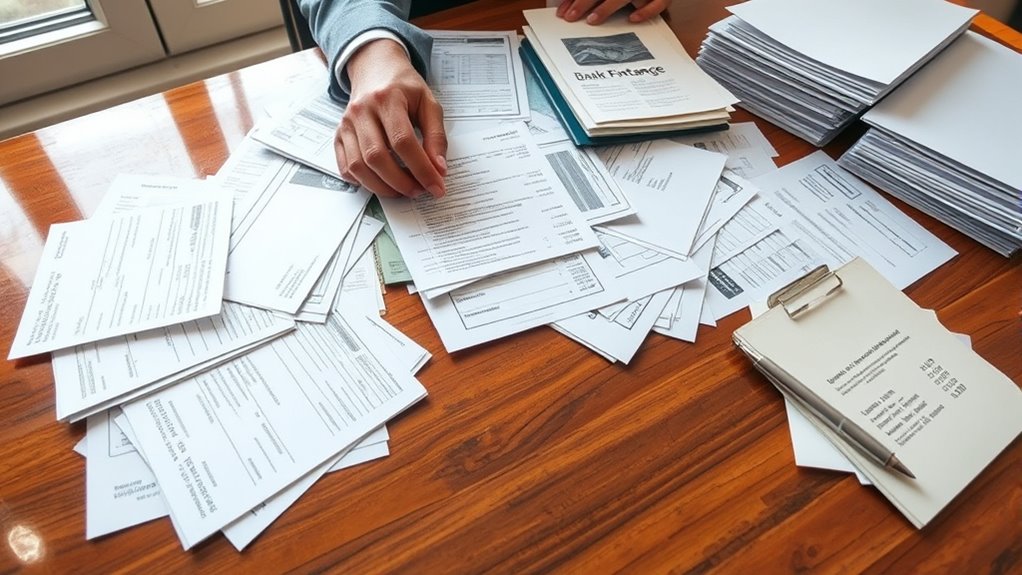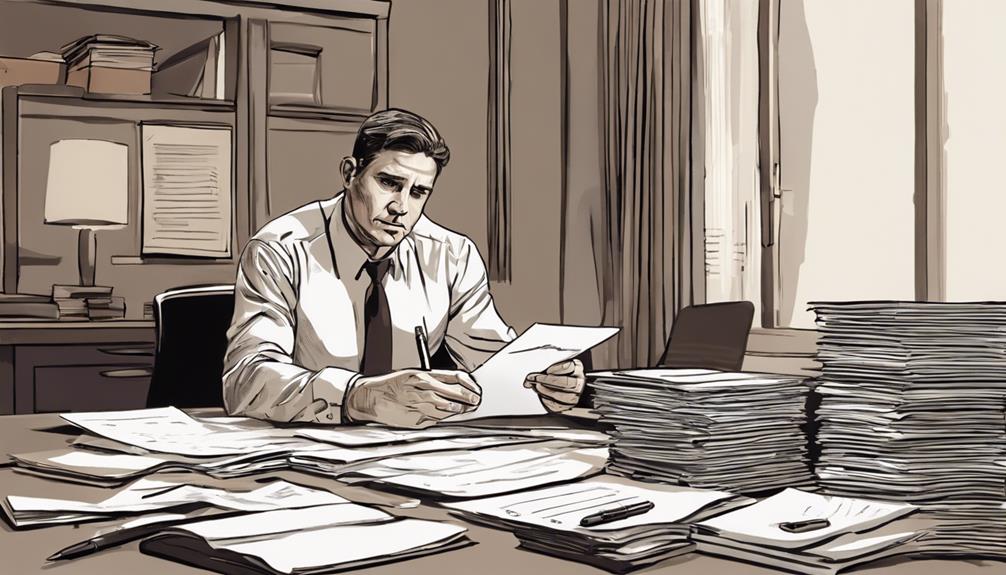To prepare for your divorce, start by collecting essential financial documents like bank statements, retirement account details, property records, and evidence of assets. Don’t forget to gather records of debts, such as loans and credit cards, as well as proof of income, including pay stubs and tax returns. Keep copies of household bills and insurance policies. Staying organized now can make the process smoother; if you keep going, you’ll learn more helpful tips to protect your interests.
Key Takeaways
- Collect all bank, savings, and investment account statements from the past few months.
- Gather documentation of real estate holdings, property titles, and mortgage details.
- Compile recent pay stubs, tax returns, W-2s, and 1099 forms for income verification.
- Obtain records of debts, loans, credit card statements, and liability details.
- Secure legal documents such as wills, trusts, prenuptial agreements, and marriage certificates.

Preparing for a divorce involves more than just emotional readiness; you also need to gather essential financial documents. Being organized from the start can make the process smoother and help you protect your interests. One of your top priorities should be understanding your marital assets and how they will be divided. This means collecting documents that detail everything you and your spouse own together, including bank accounts, retirement accounts, real estate, investments, and valuable possessions. By having a clear record of these assets, you’ll be better equipped to negotiate or present your case in court, guaranteeing a fair division.
In addition to assets, it’s vital to gather documentation related to debt division. This includes all outstanding debts—mortgages, credit cards, student loans, personal loans, and any other liabilities. Knowing exactly what you owe and what your spouse owes can influence how assets are split and help prevent surprises later on. Be sure to collect recent statements, loan agreements, and payment histories. Organizing these documents allows you to understand your financial obligations and evaluate your net worth. Understanding how debts impact your overall financial picture can also help in debt management strategies.
You should also gather proof of your income, such as pay stubs, tax returns, and W-2s or 1099 forms. This information helps establish your earning capacity and supports your financial claims during divorce negotiations. Similarly, collecting bank and investment account statements from the last few months provides a snapshot of your financial health and liquidity. If you or your spouse own any business interests, gather relevant documents like business valuation reports, tax filings, and partnership agreements. Being aware of divorce alimony laws can also help inform your expectations regarding financial support after the divorce.
Don’t forget to include documents related to your expenses and household bills. Utility bills, mortgage or rent statements, insurance policies, and receipts for major purchases give a complete picture of your financial commitments. These details are especially useful for understanding your cash flow and future financial needs.
Additionally, it is important to be aware of any affiliate marketing disclosures that might be relevant if you’re researching products or services related to your financial situation, as transparency can sometimes affect the resources you use.
Lastly, it’s wise to keep copies of any legal documents pertinent to your marriage, such as prenuptial or postnuptial agreements, trusts, or wills. These can profoundly impact the division of assets and debts. Organizing all these documents in a safe, accessible place guarantees you’re ready to move forward confidently, whether you’re negotiating with your spouse or presenting your case in court. Being thorough now can save you time, reduce stress, and help you secure a fair outcome during this challenging transition.
Frequently Asked Questions
How Long Should I Keep Financial Documents After Divorce?
You should keep your financial documents after divorce for record retention and document preservation. Typically, it’s best to retain essential records like tax returns, bank statements, and property documents for at least seven years, in case of future legal or financial issues. If any disputes arise, having these documents on hand can be critical. Stay organized and store these records securely to guarantee easy access if needed later.
Should I Consult an Attorney Before Gathering Documents?
Before gathering documents, you should seriously consider seeking an attorney consultation. Legal advice can help you understand what specific documents to collect and how to organize them effectively. An attorney’s guidance guarantees you don’t overlook critical financial records and stay within legal boundaries. This proactive step protects your interests, prevents pitfalls, and prepares you for a smoother divorce process. Remember, professional advice can make a significant difference in your divorce journey.
What if I Can’t Find Some Financial Records?
If you can’t find some financial records, don’t panic. Focus on effective financial record retrieval by checking online accounts, contacting banks, or requesting copies from institutions. Use reliable document storage solutions to keep your records organized and accessible. If necessary, consult your attorney for guidance on obtaining missing documents or exploring alternative proof methods, ensuring your financial information is complete for the divorce process.
Are Digital Copies of Documents Acceptable?
Digital formats are generally acceptable for financial documents, but you need to verify their authenticity. When submitting digital copies, make sure they are clear, unaltered, and easily readable. Keep original files secure and consider getting notarized copies if necessary. Some courts or professionals might prefer paper originals, so verify their requirements. Always save multiple copies and back them up to avoid any issues during the divorce process.
How Do I Organize Documents for Court Submission?
Ever wondered how to make your court submission smoother? You need to master document organization now. Start by sorting your financial papers into clear categories—bank statements, pay stubs, assets—and label each file. Keep digital copies handy, but print key documents for easy access. Use a consistent system, like folders or binders, so everything’s ready when you present your case. Well-organized documents could be your secret weapon in court.
Conclusion
By gathering all your financial documents early, you’re protecting yourself and making the divorce process smoother. Did you know that over 60% of divorce cases face financial disputes due to missing or incomplete records? Don’t let that be you. Take the time now to organize your paperwork—it’s a vital step toward securing your future. Staying proactive can make all the difference in ensuring a fair division and peace of mind.










